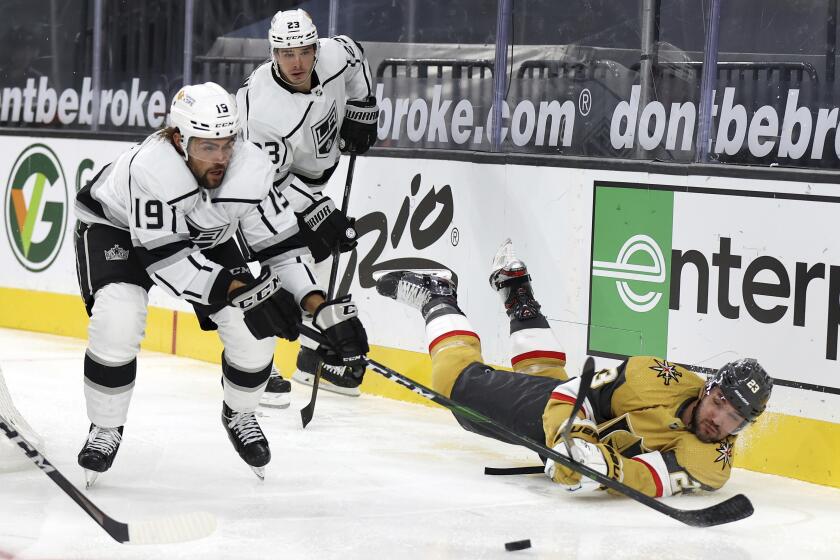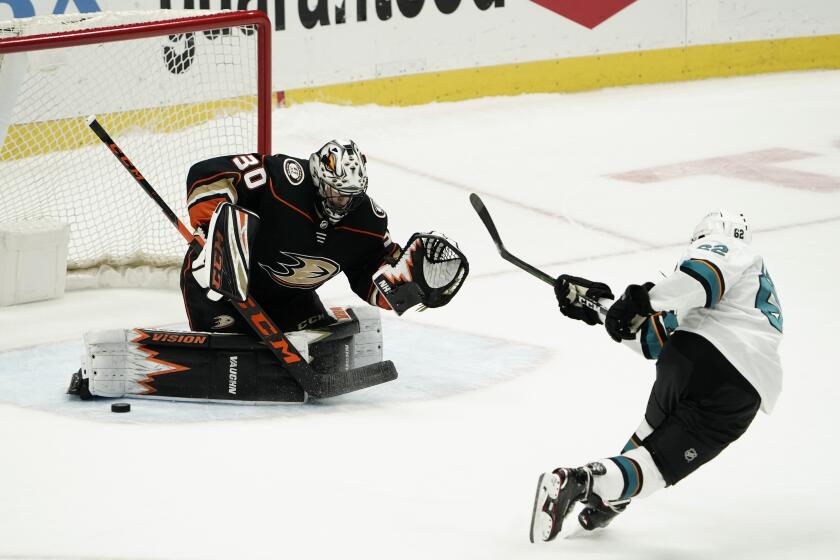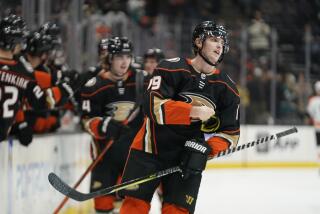Column: With no bubble, the NHL season is in trouble. But there is a solution
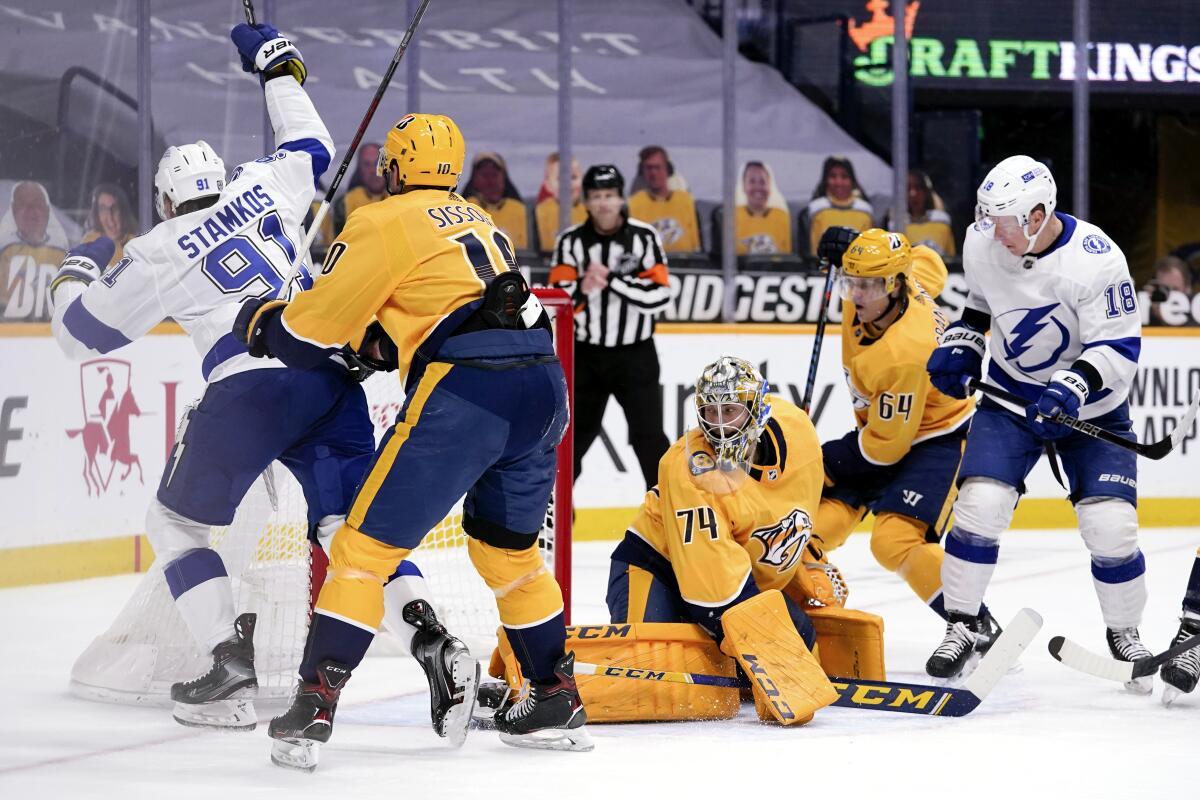
- Share via
Returning to a bubble this season was a non-starter for the NHL. Staging the 2019-20 playoffs in a controlled environment without fans kept COVID-19 at bay — and spared Commissioner Gary Bettman from being booed when he handed the Stanley Cup to the Tampa Bay Lightning — but replicating those conditions wasn’t considered a long-term solution.
“We couldn’t very well ask the players to put themselves in a bubble for six months. We knew that wasn’t going to be something we could even ask,” Bettman said last month before he launched the abbreviated 2020-21 season.
“We understand there is an element of risk that COVID-19 may impact one or more games. We are going to need to be flexible and agile in how we deal with whatever we’re confronted with and we are, again, prepared to do that.”
Despite adopting elaborate safety measures and modifying those plans on the fly during the first few weeks of the season, the NHL’s flexibility is being sternly challenged. With 34 games postponed as of late Tuesday and four teams on extended pauses, it’s time for the league to consider taking a break to allow additional protective measures to be put in place and enable players in COVID protocol to emerge safely.
If that means cutting the schedule to 48 games, cut it: Bettman considered 48-game seasons long enough to be legitimate after he imposed lockouts in 1994-95 and 2012-13. Given the circumstances, 48 is enough.
The Buffalo Sabres, Colorado Avalanche, Minnesota Wild and New Jersey Devils are on hold because of absences related to COVID protocols, and the Vegas Golden Knights only recently emerged from a nine-day hiatus.
The Los Angeles Kings’ home game against Minnesota scheduled for Saturday has been postponed because of COVID-19 protocol issues with the Wild.
The Sabres last played Jan. 31 when they faced New Jersey, which had six players in COVID protocol. The Devils added four players to that list the next day. As of Tuesday, 19 Devils were on the daily list of unavailable players. The Devils aren’t scheduled to play again until Feb. 16, which seems an overly optimistic target.
“We come into a situation where potentially it was in the New Jersey locker room and now we are where we are,” Sabres general manager Kevyn Adams said during a videoconference.
The Sabres, who are scheduled to return to play next Monday, practiced Tuesday for the first time in eight days but without nine players who are in the protocol. Also missing was coach Ralph Krueger, who tested positive.
Adams said some absent players are symptomatic. According to the NHL, COVID protocol-related absences can be because of an initial unconfirmed positive test; isolation for those showing symptoms; being in quarantine as a high-risk close contact; isolation based on a confirmed positive test, and/or quarantine required by travel.
Only the North division, comprised of the Canada-based teams, has dodged the reshuffling and uncertainty enveloping the other 24. Those seven teams have no one in COVID protocol. Good on them for staying safe.
In recent days the NHL has increased the use of rapid testing, told teams to remove the glass behind the benches to increase air flow and asked for greater distances between players in locker rooms. The league hasn’t yet outlawed fighting or hugging after goals. And it’s still insisting on bringing four teams to Lake Tahoe to play outdoor games on Feb. 20 and Feb. 21, unnecessary trips for unnecessary gatherings.
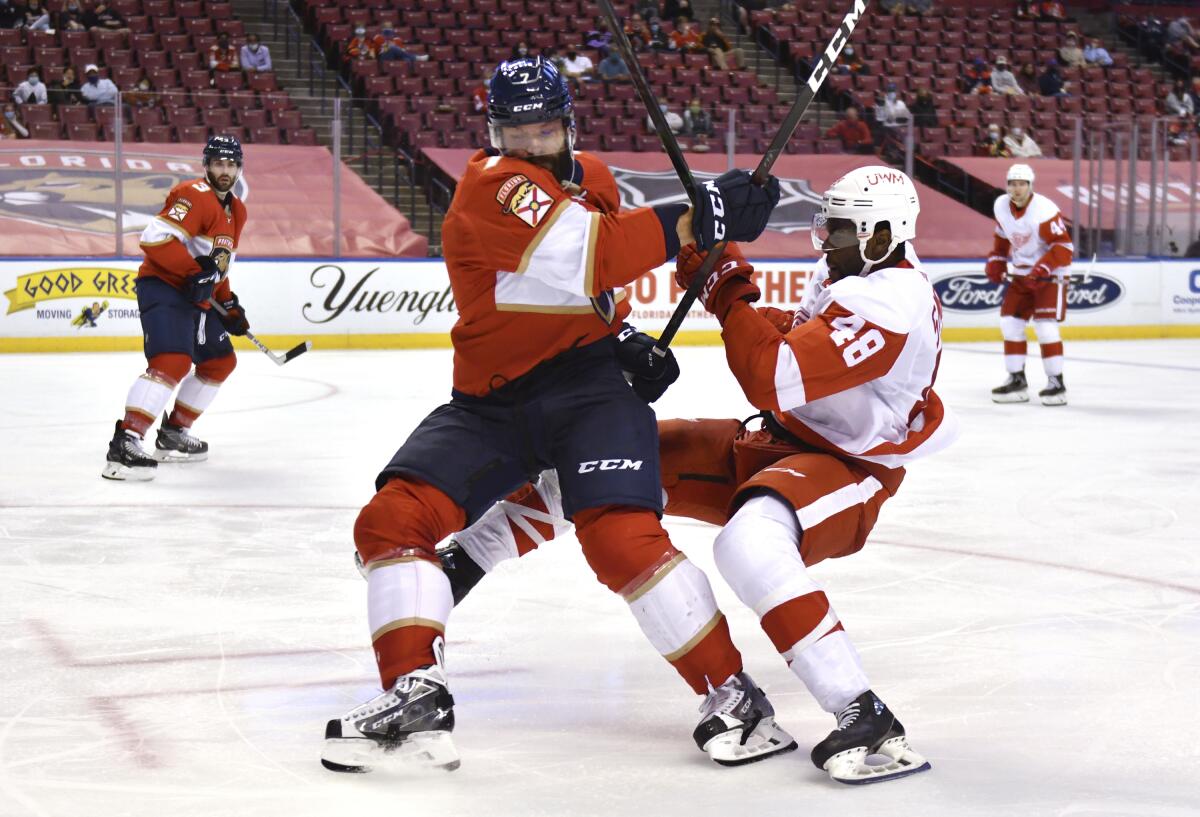
“I think what you’re going to see is that there’s a lot of learning going on,” Adams said. “What happens, what we learn from our situation, will the league learn and make changes as we go? That’s likely.”
Minnesota, which last played Feb. 2, had 12 players listed as unavailable Tuesday. The Wild have had six games postponed and aren’t scheduled to play again until Feb. 16, when they face the Kings at Staples Center. The Flyers’ game against the Washington Capitals on Tuesday was postponed after a second member of the Flyers entered COVID protocol, according to a league statement, and the Flyers’ list Tuesday included team captain Claude Giroux.
Teams aren’t obligated to provide information on the status of players who are unavailable because of COVID protocol, but Wild general manager Bill Guerin said some of his players tested positive and were symptomatic. He also still expects teams to be able to complete their 56-game schedules.
“This is no time to be complaining. This is not the time for that,” he told the St. Paul Pioneer Press. “This will be the time to be appreciative that we’re able to get back to play. Just dealing with it. The schedule is tough as it is, so if we can get back and cram a few more games in, then that’s the way we’ll do it.”
Ryan Miller became the second goalie in NHL history to reach 60 shootout wins in leading the Ducks to a 2-1 victory over San Jose on Saturday night.
The Sabres were scheduled to play 46 games in 86 days before they had six postponements, and to cram games in simply for the sake of getting to 56 makes no sense. Why risk injuries and a drop in the quality of play? The NHL, in rescheduling some games, has matched the St. Louis Blues and Arizona Coyotes against each other seven straight times. That’s just too much for anything but a playoff series.
Extending the season beyond May 8 and delaying the playoffs past the current endpoint of July 9 probably wouldn’t work for NBC, the NHL’s TV partner. A later end for hockey would cut into NBC’s promotion of its coverage of the Tokyo Olympics, which are scheduled to open July 23. And even Bettman conceded that taking the playoffs into late summer last season contributed to low TV ratings.
So here we are, monitoring the daily list of COVID protocol-related absences more closely than we monitor the lists of scoring and goaltending leaders. A pause to re-examine safety policies and let everyone catch their breath should be the next step.
More to Read
Go beyond the scoreboard
Get the latest on L.A.'s teams in the daily Sports Report newsletter.
You may occasionally receive promotional content from the Los Angeles Times.

